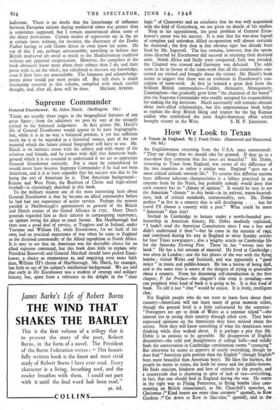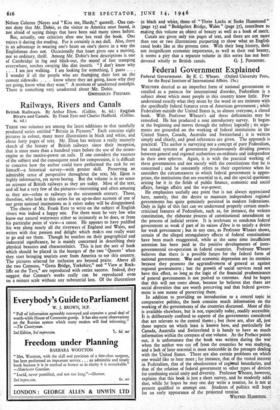How We Look to Texas
AN Englishwoman returning from the U.S.A. once commented: " They say things that we should take for granted. If they go to, a rose-show they comment that the roses are beautiful." Mr. Dobie, returning to Texas from England, was aware of the difference of the two countries in rather a similar way. England " gave me a more critical attitude towards life." To assume that different nations have different inherent characteristics is a fallacy practised in an extreme form by the Nazis, but probably nobody would deny that each country has its " climate of opinion." It .would be easy to see the American " climate " in this book—in its naïveté, warm-hearted- ness, lack of critical standards, sentimentality, zest. Mr. Dobie prefers " to live in a country that is still developing . . . but for travel I'll choose a country with a past." What could be more " American " than that?
Invited to Cambridge to lecture under a newly-founded pro- fessorship in American history, Mr. Dobie modestly explained, " I hadn't read the American Constitution since I was a boy and didn't understand it then "—but he came in the autumn of 1943, and continued during his stay in England to write Sunday articles for four Texas newspapers ; also a lengthy article on Cambridge life for the Saturday Evening Post. These he has " woven into the book." He has a fair amount of material. He lived at Cambridge ; was often in London ; saw the last phases of the war with the flying bombs ; visited Wales and Scotland, and was apparently a " good mixer " in trains and public-houses. He has a horror of being dull, and at the same time is aware of the dangers of trying to generalise about a country. From his disarming self-introduction in the first chapter, P. for Preface—the chapter's title even is revealing—one can prophesy what kind of book it is going to be. . It is that kind of book. To call it just " chat " would be unjust. It is lively, intelligent chat.
For English people who do not want to learn facts about their country—Americans will not learn many of great moment either, though the general level is a little caricatured by the sentence: " Foreigners are apt to think of Wales as a separate island "—the interest lies in seeing their country through other eyes. They have expressed opinions on the Americans they have noticed about the streets. Now they will know something of what the Americans were thinking while they walked about. It is perhaps a pity that Mr. Dobie is so anxious to be agreeable. He disapproves of English discomfort—the cold and draughtiness of college halls—and mildly finds the conversation in Cambridge combination rooms "cramping." But otherwise he seems to approve of nearly everything, though he does find " American girls prettier than the English " (though English boys more beautiful than American boys). He likes the barbers, the people he meets in trains, the lords he meets and the public-houses. He finds stoicism, kindness and love of animals in the people, and a countryside that is charming in spite of lack of sun—everything, in fact, that one should find in England during the war. He reacts in the right way to Flying. Fortresses, to flying bombs (also com- menting on British insouciance), to Mr. Churchill's speeches, to Christmas ("Kind hearts are more than coronets " quoted); to Kew Gardens ("Go down to Kew in lilac-time " quoted), and to the
Nelson Column (Noyes and "Kiss me, Hardy," quoted). One can- not deny that Mr. Dobie, as the visitor to America once found, is not afraid of saying things that have been said many times before.
But, actually, one criticises after one has read the book. One enjoys it during the reading. For it certainly is not dull. Also, there is an advantage in wearing one's heart on one's sleeve in a way the Englishman does not. Occasionally that heart gives one a moving, not so ordinary, thrill. Among Mr. Dobie's .best descriptions is one of Cambridge in fog and black-out, the sound of feet tramping everywhere, torches swaying like dim insects. " I don't know why . . . I am just walking. I am looking for something, I guess . . . I wonder if all the people who are thurntoing their feet on the cement sidewalks . . . know where they are going, know why they are going, know what they want." A moment of unadorned nostalgia. There is something very unadorned about Mr. Dobie.
GWENDOLEN FREEMAN.































 Previous page
Previous page